[Click on BLUE links for sources and information]
Traveler, your footprints
by Antonio Machado
Translators Mary G. Berg and Dennis Maloney
Traveler, your footprints
are the only road, nothing else.
Traveler, there is no road;
you make your own path as you walk.
As you walk, you make your own road,
and when you look back
you see the path
you will never travel again.
Traveler, there is no road;
only a ship’s wake on the sea.
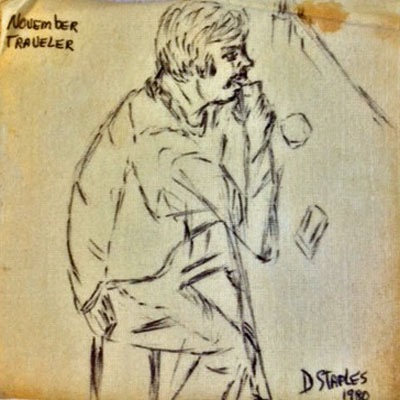
Sea Gull Cellar Bar Napkin Art, D. Staples artist
In the past few posts TITM has been focused on travel. Since it is summertime and given that many of us travel in the summer, we thought it might be interesting to investigate whether travel encourages peace in the world. In the words of one local Mendocino character, is travel “a betterment, or a determent” to ourselves and to society?
There is no single answer. The hero of Voltaire’s most popular satire, Candide, exclaims: “Certainly a man should travel.” This is in direct contradiction to the advice he receives from the wise Old Man in El Dorado. In fact, Candide the traveler encounters one mishap after another until he finally returns to the safety of his garden to live out the rest of his life with his friends. [Not that gardens are always safe, mind you.]
“Certainly a man should travel.” Candide
“The kingdom where we now are is the ancient country of the Incas, who most imprudently left it to conquer part of the world and were at last destroyed by the Spaniards. The princes of their family who remained in their native country had more wisdom; with the consent of the nation, they ordered that no inhabitants should ever leave our little kingdom, and this it is that has preserved our innocence and our felicity.” Old Man
Candide, Chapter 18: What They Saw in the Land of El Dorado, Translation by Richard Aldington, The Portable Voltaire

Sea Gull Cellar Bar Napkin Art, Roy Hoggard artist
The Chinese sage, Lao Tzu, in the Tao Te Ching, seems to agree with Voltaire’s Old Man of El Dorado. Little is known about Lao Tzu, whether he actually existed, if he wrote the Tao alone or if there were a number of authors. Some legends say Lao Tzu travelled throughout China sharing his philosophical thoughts. It is said that in old age he left the kingdom riding a water buffalo past The Great Wall into unknown lands. It appears that Lao Tzu was a traveler even if he sometimes advocated against it. Life is complicated.
Tao Te Ching: Verse 80
Stephen Miller
If a country is governed wisely,
its inhabitants will be content.
They enjoy the labor of their hands
and don’t waste time inventing
labor-saving machines.
Since they dearly love their homes,
they aren’t interested in travel.
There may be a few wagons and boats,
but these don’t go anywhere.
There may be an arsenal of weapons,
but nobody ever uses them.
People enjoy their food,
take pleasure in being with their families,
spend weekends working in their gardens,
delight in the doings of the neighborhood.
And even though the next country is so close
that people can hear its roosters crowing and its dogs barking,
they are content to die of old age
without ever having gone to see it.
For me, as much as I enjoy being solitary with my books, life without travel would be boring. Many people have argued that travel can promote peace and harmony in a diverse world. If true, that provides as good a reason as any to visit different places. The causation also runs the other way. A peaceful world makes travel easier and safer.
If you’re twenty-two, physically fit, hungry to learn and be better, I urge you to travel – as far and as widely as possible. Sleep on floors if you have to. Find out how other people live and eat and cook. Learn from them – wherever you go. Anthony Bourdain
Travel is fatal to prejudice, bigotry, and narrow-mindedness, and many of our people need it sorely on these accounts. Broad, wholesome, charitable views of men and things cannot be acquired by vegetating in one little corner of the earth all one’s lifetime. Mark Twain
As former US President John F. Kennedy put it, “travel has become one of the great forces for peace and understanding in our time. As people move throughout the world and learn to know each other’s customs and to appreciate the qualities of individuals of each nation, we are building a level of international understanding which can sharply improve the atmosphere for world peace.”
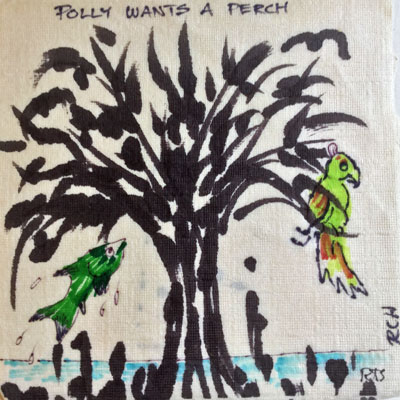
Sea Gull Cellar Bar Napkin Art, Roy Hoggard artist
Not only does travel encourage world peace, traveling makes you a better person, less prejudiced and more knowledgeable. I think of the story of Richard Henry Dana, something I briefly covered in a past post. Dana’s voyage from Boston around Cape Horn to California changed his life. He became an advocate for the abolition of slavery and worked to better the lives of the poor and marginalized.
Alexander von Humboldt was another famous traveler/explorer who found himself changed in ways similar to Dana. Humboldt is not so widely known today as he was in the 19th century although two recent books have put Humboldt and his theories back in the spotlight: The Invention of Nature: Alexander von Humboldt’s New World by Andrea Wulf and The Passage to Cosmos: Alexander von Humboldt and the Shaping of America by Laura Dassow Walls.
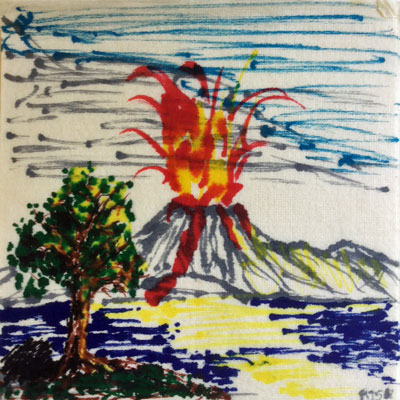
Sea Gull Cellar Bar Napkin Art, Bob Seaver artist
According to Walls, Humboldt “spent a lifetime agonizing over deforestation and environmental degradation, the oppression of indigenous peoples, political disenfranchisement of minorities and dissidents [and] the horrific injustice of slavery.” If these are the kind of concerns that travel encouraged in Dana and Humboldt, it is no wonder that so many brilliant people recommend it.
If only it were that easy. Two travelers, no matter how much of a voice they have, can do very little. Dana could not convince the Boston blue-bloods to support abolition. Daniel Webster vexed Dana because with his eyes on the Presidency, he felt compelled to support the Fugitive Slave Law (the law that returned escaped slaves to their owners) so as not to alienate the South. Unfortunately prejudice, fear of difference and compromise of values in the face of economic and political incentives are all too human as we see under our current President. It took a Civil War to end slavery and even then discrimination continues to this day.
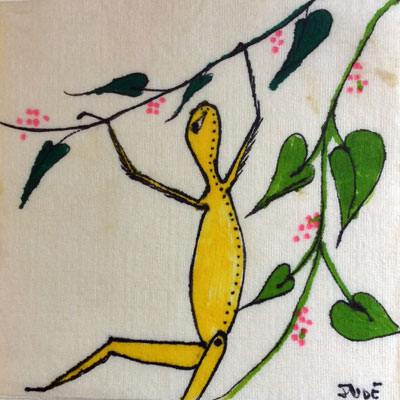
Sea Gull Cellar Bar Napkin Art, artist unknown
Laura Dassow Walls in her fine book delineates how travelers, Humboldt in particular, impact all facets of society including the arts, science, religion and politics.
Humboldt had an enormous influence on the intellectual elites (Ralph Waldo Emerson, Henry David Thoreau, Edgar Allen Poe, Walt Whitman, Melville, Charles Darwin, Frederic Church, Franz Boas and John Muir just to name a few). He visited President Jefferson at the White House and was friends with Madison and Gallatin. He set the bar for many travelers who followed him. He became famous for his thematic maps of the areas he visited.
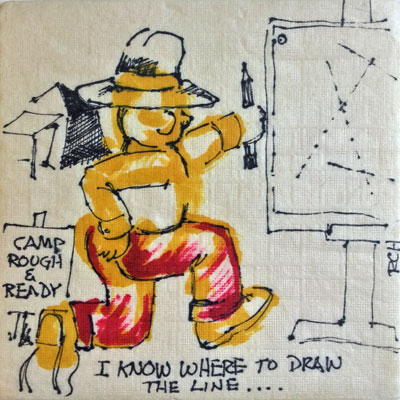
Sea Gull Cellar Bar Napkin Art, Roy Hoggard artist
“If you really want to have a notion of tropical countries, study Humboldt.” Charles Darwin
The irony in The Passage to Cosmos is that “while elites continued to see Humboldt as a living encyclopedia well into the 1830s, the “rougher classes” had already come to understand his work in more modern, post-Cosmos, ways.” While Humboldt spoke passionately against imperialism, expansionist policies, slavery, and environmental degradation, his travels were used in part to justify and make possible the American mystique of “manifest destiny” and to assist the world’s imperialist powers in subjugating the less developed countries they occupied. Humboldt was an outspoken anti-imperialist but traveled through imperial networks and thus helped to galvanize an entire generation of traveling naturalists who viewed the world through imperial eyes. For every upside there is often the downside of unintended consequences.
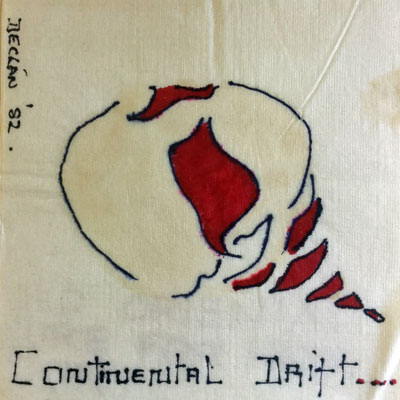
Sea Gull Cellar Bar Napkin Art, Declan artist
Travelers like Dana and Humboldt do counter the theory that all explorers are exploiters. But, throughout history they and their followers are the exception. Travel allows us to overcome some of our prejudices, true, but it also provides a theater in which to carry them out.
World peace for Humboldt includes peace with nature as well as peace with men. Humboldt’s enormous output was a “mad scramble of nature and culture.” (Walls) He wrote with satisfaction that his study of the indigenous peoples of the Americas begins at a time when “we no longer consider as unworthy of our attention anything that diverges from the style that the Greeks bequeathed to us through their inimitable models.” He firmly believed “neither humans nor nature can be understood in isolation.” For him, “nature was never merely background but played an essential role in the development of human societies.”
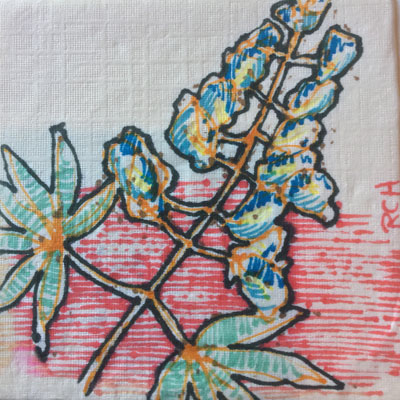
Sea Gull Cellar Bar Napkin Art, Roy Hoggard artist
But, who other than the traveler can pull us out of the muck?
“It is for the traveler who has been an eyewitness of the degradation of human nature, to make the complaints of the unfortunate reach the ear of those by whom they can be relieved.” Alexander von Humboldt
Throughout his work, “Humboldt espoused the idea that, while the universe of nature exists apart from human purpose, its beauty and order, the very idea of the whole it composes, are human achievements: cosmos comes into being in the dance of world and mind, subject and object, science and poetry.” [Walls]
The historian Felipe Fernández-Armesto wrote that history has two big stories: how human cultures diverged thousands of years ago, and how they found one another again. If this is true, then it is Humboldt and his ilk who have facilitated the reunion. Judging from the daily news, we still have a long way to go.
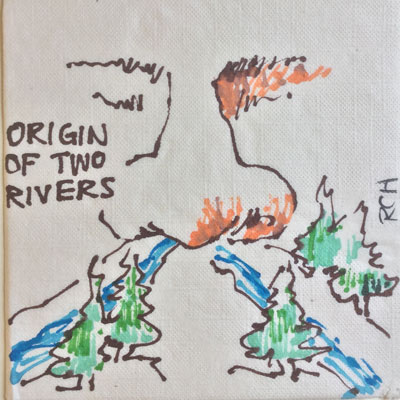
Sea Gull Cellar Bar Napkin Art, Roy Hoggard artist
Humboldt concluded his long essay on race in Mexico by asking about the influence of racial division on “the general wellbeing of society.” His answer was surprisingly personal: it hurts, so deeply and powerfully that the man of sensibility has no choice in a racist society but to opt out of society altogether.
But, he did not opt out. He worked until his last breath at age 89 to complete his great work, Kosmos.
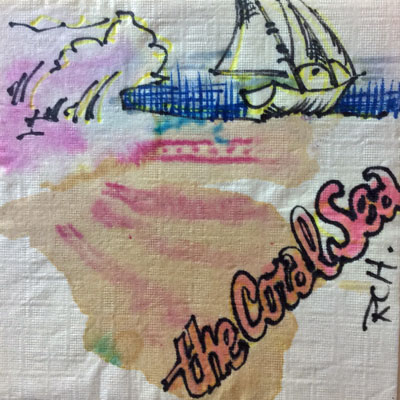
Sea Gull Cellar Bar Napkin Art, Roy Hoggard artist
Humboldt was known during his lifetime as the most famous man after Napoleon. The two were born on the same day. “Humboldt continued to represent the antitype to the empire of force and bloodshed. In a poem celebrating “the Napoleon of Science” (written for the Boston Humboldt centennial in 1869), Oliver Wendell Holmes invoked Humboldt’s “bloodless triumphs” that “cost no sufferer’s tear!”
BONAPARTE, AUG 15TH, 1769 – HUMBOLDT, SEPT. 14TH, 1769
by Oliver Wendell Holmes
Ere yet the warning chimes of midnight sound,
Set back the flaming index of the year,
Track the swift-shifting seasons in their round
Through five score circles of the swinging sphere.
Lo, in yon islet of the midland sea
That cleaves the storm-cloud with its snowy crest,
The embryo heir of empires yet to be,
A month-old babe upon his mother’s breast.
Those little hands, that soon shall grow so strong
In their rude grasp great thrones shall rock and fall,
Press her soft bosom, while a nursery song
Holds the world’s master in its slender thrall.
Look ! a new crescent bends its silver bow;
A new-lit star has fired the eastern sky;
Hark ! by the river where the lindens blow
A waiting household hears an infant’s cry.
This, too, a conqueror ! His vast domain,
Wider than widest scepter-shadowed lands;
Earth, and the weltering kingdom of the main
Laid their broad charters in his royal hands.
His was no taper lit in cloistered cage,
Its glimmer borrowed from the grove or porch;
He read the record of the planet’s page
By Etna’s glare and Cotopaxi’s torch.
He heard the voices of the pathless woods;
On the salt steppes he saw the starlight shine;
He scaled the mountain’s windy solitudes,
And trod the galleries of the breathless mine.
For him no fingering of the love-strung lyre,
No problem vague, by torturing schoolmen vexed;
He fed no broken altar’s dying fire,
Nor skulked and scowled behind a Rabbi’s text.
For God’s new truth he claimed the kingly robe
That priestly shoulders counted all their own,
Unrolled the gospel of the storied globe,
And led young Science to her empty throne.
While the round planet on its axle spins
One fruitful year shall boast its double birth,
And show the cradles of its mighty twins,
Master and Servant of the sons of earth.
Which wears the garland that shall never fade,
Sweet with fair memories that can never die?
Ask not the marbles where their bones are laidd,
But how thine ear to hear thy brothers’ cry:–
“Tear up the despot’s laurels by the root,
Like mandrakes shrieking as they quit the soil !
Feed us no more upon the blood-red fruit
That sucks its crimson from the heart of Toil !
“We claim the food that fixed our mortal fate;
Bend to our reach the long-forbidden tree !
The angel frowned at Eden’s eastern gate,–Its western portal is forever free !
“Bring the white blossoms of the waning year,
Heap with full hands the peaceful conqueror’s shine
Whose bloodless triumphs cost no sufferer’s tear !
Hero of knowledge, be our tribute thine !”
Two anecdotes were widely circulated to confirm this ideology of peaceful conquest. In one, Humboldt, laden with awards and adulation after his return from America, was presented at Napoleon’s court. “You collect plants?” asked the emperor. “Yes,” answered Humboldt. “So does my wife,” sneered Napoleon.
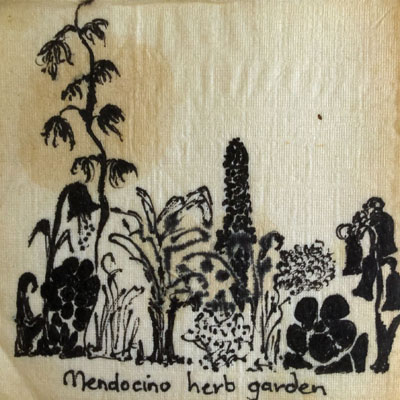
Sea Gull Cellar Bar Napkin Art, artist unknown
In another brush with royalty, the young brothers Humboldt were honored in their Berlin home with a visit by Frederick the Great. Of Wilhelm, the elder, the king is said to have asked, “Do you not wish to become a soldier?” “No, Sire,” answered the boy, “I wish to have my career in literature.” Turning to Alexander, the king reminded the eight-year-old of his great namesake, the “earth-conqueror” [Alexander the Great]. “Do you wish to be a conqueror too?” “Yes, Sire,” answered Alexander, “but with my head.” [Walls]
Travel may not bring world peace, but the benefits last far longer than any empire.

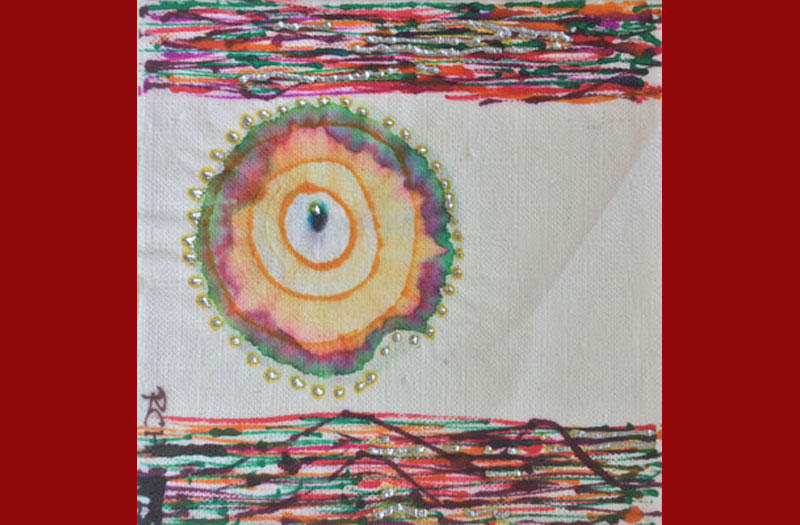
Why isn’t Roy Hoggard world-renown?
He is world-renown. According to Google Analytics I have viewers from around the US, from Mexico, France, the UK, Canada, Russia, China, India, Spain, Italy, Turkey, Peru, Nigeria, the Phillipines, New Zealand, Greece, Hungary, Czech Republic, and S. Korea. Some, maybe many, of these are bots set up to send me spam or phish for information. I always delete any of these when they come in. But, many are actual viewers some of whom I’ve heard from outside the comments. So, Roy is World Famous !
Great to see Roy’s art again. Sing along with his song.